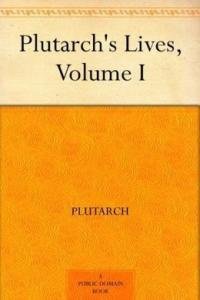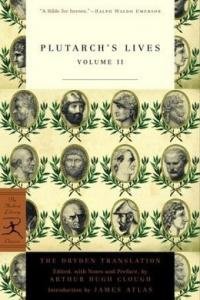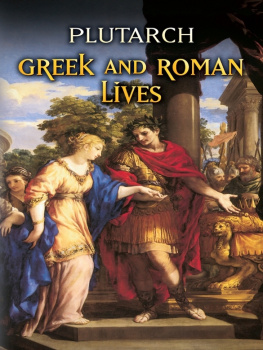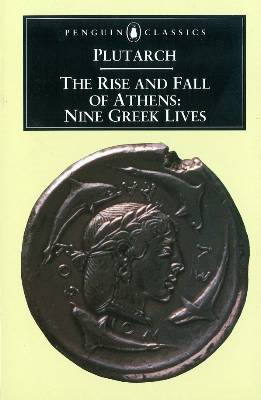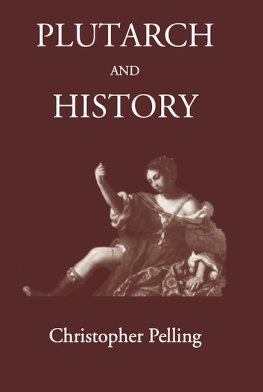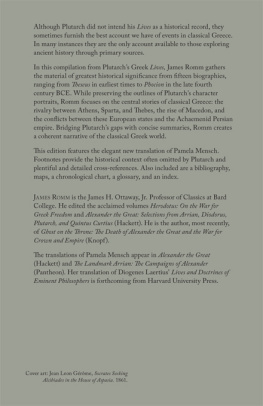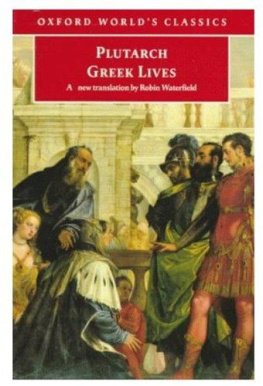Plutarh - Plutarch's Lives: Volume I
Here you can read online Plutarh - Plutarch's Lives: Volume I full text of the book (entire story) in english for free. Download pdf and epub, get meaning, cover and reviews about this ebook. year: 2014, publisher: epubBooks Classics, genre: Science. Description of the work, (preface) as well as reviews are available. Best literature library LitArk.com created for fans of good reading and offers a wide selection of genres:
Romance novel
Science fiction
Adventure
Detective
Science
History
Home and family
Prose
Art
Politics
Computer
Non-fiction
Religion
Business
Children
Humor
Choose a favorite category and find really read worthwhile books. Enjoy immersion in the world of imagination, feel the emotions of the characters or learn something new for yourself, make an fascinating discovery.
Plutarch's Lives: Volume I: summary, description and annotation
We offer to read an annotation, description, summary or preface (depends on what the author of the book "Plutarch's Lives: Volume I" wrote himself). If you haven't found the necessary information about the book — write in the comments, we will try to find it.
Plutarch's Lives: Volume I — read online for free the complete book (whole text) full work
Below is the text of the book, divided by pages. System saving the place of the last page read, allows you to conveniently read the book "Plutarch's Lives: Volume I" online for free, without having to search again every time where you left off. Put a bookmark, and you can go to the page where you finished reading at any time.
Font size:
Interval:
Bookmark:
Plutarch's Lives: Volume I
Plutarch
Preface
No apologies are needed for a new edition of so favourite an author as Plutarch. From the period of the revival of classical literature in Europe down to our own times, his writings have done more than those of any other single author to familiarise us with the greatest men and the greatest events of the ancient world.
The great Duke of Marlborough, it is said, confessed that his only knowledge of English history was derived from Shakespeare's historical plays, and it would not be too much to say that a very large proportion of educated men, in our own as well as in Marlborough's times, have owed much of their knowledge of classical antiquity to the study of Plutarch's Lives. Other writers may be read with profit, with admiration, and with interest; but few, like Plutarch, can gossip pleasantly while instructing solidly; can breathe life into the dry skeleton of history, and show that the life of a Greek or Roman worthy, when rightly dealt with, can prove as entertaining as a modern novel. No one is so well able as Plutarch to dispel the doubt which all schoolboys feel as to whether the names about which they read ever belonged to men who were really alive; his characters are so intensely human and lifelike in their faults and failings as well as in their virtues, that we begin to think of them as of people whom we have ourselves personally known.
His biographies are numerous and short. By this, he avoids one of the greatest faults of modern biographers, that namely of identifying himself with some one particular personage, and endeavouring to prove that all his actions were equally laudable. Light and shade are as necessary to a character as to a picture, but a man who devotes his energies for years to the study of any single person's life, is insensibly led into palliating or explaining away his faults and exaggerating his excellencies until at last he represents him as an impossible monster of virtue. Another advantage which we obtain by his method is that we are not given a complete chronicle of each person's life, but only of the remarkable events in it, and such incidents as will enable us to judge of his character. This also avoids what is the dreariest part of all modern biographies, those chapters I mean which describe the slow decay of their hero's powers, his last illness, and finally his death. This subject, which so many writers of our own time seem to linger lovingly upon, is dismissed by Plutarch in a few lines, unless any circumstance of note attended the death of the person described.
Without denying that Plutarch is often inaccurate and often diffuse; that his anecdotes are sometimes absurd, and his metaphysical speculations not unfrequently ridiculous, he is nevertheless generally admitted to be one of the most readable authors of antiquity, while all agree that his morality is of the purest and loftiest type.
The first edition of the Greek text of Plutarch's Lives appeared at Florence in the year 1517, and two years afterwards it was republished by Aldus. Before this, however, about the year 1470, a magnificent Latin version by various hands appeared at Rome. From this, from the Greek text, and also from certain MSS. to which he had access, Amyot in the year 1559 composed his excellent translation, of which it has been well said: "Quoique en vieux Gaulois, elle a un air de fraicheur qui la fait rejeunir de jour en jour."
Amyot's spirited French version was no less spiritedly translated by Sir Thomas North. His translation was much read and admired in its day; a modern reviewer even goes so far as to say that it is "still beyond comparison the best version of Parallel Lives which the English tongue affords." Be this as it may, the world will ever be deeply indebted to North's translation, for it is to Shakespeare's perusal of that work that we owe 'Coriolanus,' 'Antony and Cleopatra,' and 'Julius Caesar.'
North's translation was followed by that known as Dryden's. This work, performed by many different hands, is of unequal merit. Some Lives are rendered into a racy and idiomatic, although somewhat archaic English, while others fall far short of the standard of Sir Thomas North's work. Dryden's version has during the last few years been reedited by A.H. Clough, Fellow of Oriel College, Oxford.
The translation by which Plutarch is best known at the present day is that of the Langhornes. Their style is certainly dull and commonplace, and is in many instances deserving of the harsh epithets which have been lavished upon it. We must remember, however, before unsparingly condemning their translation, that the taste of the age for which they wrote differed materially from that of our own, and that people who could read the 'Letters of Theodosius and Constantia' with interest, would certainly prefer Plutarch in the translation of the Langhornes to the simpler phrases of North's or Dryden's version. All events, comic or tragic, important or commonplace, are described with the same inflated monotony which was mistaken by them for the dignity of History. Yet their work is in many cases far more correct as a translation, and the author's meaning is sometimes much more clearly expressed, than in Dryden's earlier version. Langhorne's Plutarch was reedited by Archdeacon Wrangham in the year 1819.
In 1844, thirteen Lives were translated by that eminent scholar the late Mr. George Long; and it is by way of complement to these Lives that the present version was undertaken with his consent and his approval.
Those translated by Mr. Long were selected by him as illustrating a period of Roman history in which he was especially interested, and will therefore be found to be more fully annotated than the others. It has seemed to me unnecessary to give information in the notes which can at the present day be obtained in a more convenient form in Dr. Smith's Classical Dictionary and Dictionary of Antiquities, many of the articles in which are written by Mr. Long himself. The student of classical literature will naturally prefer the exhaustive essays to be found in these works to any notes appended to Plutarch's text, while to those who read merely "for the story," the notes prove both troublesome and useless.
In deciding on the spelling of the Greek proper names, I have felt great hesitation. To make a Greek speak of Juno or Minerva seems as absurd as to make a Roman swear by Herakles or Ares. Yet both Greek and Roman divinities are constantly mentioned. The only course that seemed to avoid absolute absurdity appeared to me to be that which I have adopted, namely to speak of the Greek divinities by their Greek, and the Latin ones by their Latin names. In substituting a k for the more usual c, I have followed the example of Grote, who in his History spells all Greek names exactly as they are written, with the exception of those with which we are so familiar in their Latin form as to render this practically impossible; as for instance in the case of Cyprus or Corinth, or of a name like Thucydides, where a return to the Greek k would be both pedantic and unmeaning.
The text, which I have followed throughout, is that of C. Sintenis, Leipsic, 1873.
AUBREY STEWART.
Preface to the CIVIL Wars of Rome.
Among the extant Lives of Plutarch there are thirteen Lives of Romans which belong to the most eventful period of Roman history. They are the lives of the brothers Tiberius and Caius Sempronius Gracchus, of Caius Marius, Lucius Cornelius Sulla, Quintus Sertorius, Marcus Licinius Crassus, Cneius Pompeius Magnus, Marcus Porcius Cato the Younger, Marcus Tullius Cicero, Lucius Licinius Lucullus, Caius Julius Caesar, Marcus Junius Brutus, and Marcus Antonius. From the year of the death of Tiberius Gracchus, B.C. 133, to the death of Marcus Antonius, B.C. 30, a period of about one hundred years, the Roman State was convulsed by revolutions which grew out of the contest between the People and the Nobility, or rather, out of the contests between the leaders of these two bodies. This period is the subject of Appian's History of the Civil Wars of the Romans, in Five Books. Appian begins with the Tribunate and legislation of Tiberius Gracchus, from which he proceeds to the Dictatorship of Sulla, and then to the quarrels between Pompeius and Caesar, and Caesar's Dictatorship and assassination. He then proceeds to the history of the Triumvirate formed after Caesar's death by his great nephew Caius Julius Caesar Octavianus, Marcus Antonius, and Lepidus, the quarrels of the Triumviri, the downfall of Lepidus, who was reduced to the condition of a private person, and the death of Sextus Pompeius, the last support of the party in whose cause his father, Cneius Pompeius, lost his life. The remainder of this History, which is lost, carried the narration down to the quarrels of Octavianus and Marcus Antonius, which ended in the defeat of Antonius in the battle of Actium, B.C. 31, and his death in Egypt, B.C. 30. The victory over Antonius placed all the power in the hands of Octavianus, who, in the year B.C. 27, received from the Roman Senate the title of Augustus, or the Sacred, by which name he is commonly known as the first of the long series of Roman Emperors. "He made himself," says Appian (
Font size:
Interval:
Bookmark:
Similar books «Plutarch's Lives: Volume I»
Look at similar books to Plutarch's Lives: Volume I. We have selected literature similar in name and meaning in the hope of providing readers with more options to find new, interesting, not yet read works.
Discussion, reviews of the book Plutarch's Lives: Volume I and just readers' own opinions. Leave your comments, write what you think about the work, its meaning or the main characters. Specify what exactly you liked and what you didn't like, and why you think so.

